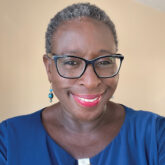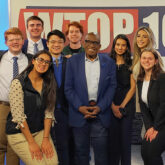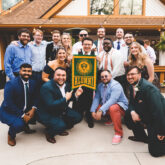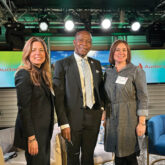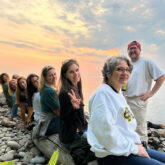
The following excerpt is from Getting Away With Murder: Benazir Bhutto’s Assassination and the Politics of Pakistan by Heraldo Muñoz ’72. In the book, he provides his personal account as the lead investigator on the United Nations Commission of Inquiry into the death of former Pakistani Prime Minister Benazir Bhutto. He has written and edited more than a dozen books on Inter-American relations and security, Latin American foreign relations, democracy and human rights, multilateral affairs, development issues and international political economy. His memoir, The Dictator’s Shadow, won the 2009 WOLA-Duke University Book Award.
In the southern-hemisphere summer of January 2009, while my wife and I vacationed in Chile at a cousin’s home by a calm river near the town of Valdivia, I got an urgent call from the office of United Nations Secretary-General Ban Ki-moon in New York. His chief of staff, Ambassador Vijay Nambiar, transmitted a request from the secretary-general: Would I be able to lead a commission to investigate the assassination of former Pakistani prime minister Benazir Bhutto?
I had serious doubts about accepting such high responsibility. The case looked like a lose-lose situation; any conclusion could leave many sides disappointed or even angry. I could not force anyone to testify, my powers would be limited, and public expectations would be high. Moreover, Pakistani political culture is characterized by rumors and conspiracy theories, as Pakistani writer Ali Sethi suggested in an essay about the terrorist attack in Lahore against the Sri Lankan national cricket team. While interviewing people in the street about the culprits, he was told that it could have been the work of “terrorists or criminals. . . . But it could be the agencies. It could be the government. It could be India also.”
I had visited the country and read about it, but I was far from being an expert, and I came from a nation geographically and culturally distant from Pakistan. Then, I reasoned, Chile did not have any hidden agenda, interests, or prejudices regarding Pakistan—a plus in the eyes of the UN and the Islamabad government. The task would be dangerous; but the secretary-general had probably taken into consideration, when offering me this challenge, that I had presided over the Al-Qaida and Taliban Sanctions Committee of the UN Security Council during 2003 and 2004.

I recalled having met Benazir Bhutto in the early ’90s, while I was ambassador to the Organization of American States (OAS), at a seminar on democratic transitions held in the US Congress. We were on the same panel; she spoke about Pakistan, and I gave a presentation on Chile. She was the star of the event and seemed poised and confident. We were able to chat for a while. I said that while doing my PhD at the Korbel School of International Studies at the University of Denver, I had often discussed her father’s 1977 military overthrow and arrest with my good Pakistani friend and classmate, Mustapha Kemal Pasha, who attended all the solidarity demonstrations that I organized against the Pinochet dictatorship and the 1973 coup that had overthrown Chilean president Salvador Allende. Benazir told me that Zulfikar Ali Bhutto admired Allende and knew perfectly well that the United States had plotted with rightists in Chile to oust his socialist government. The rest of our dialogue was a brief exchange of pleasantries during our respective lectures.
Now, almost twenty years later, I would lead the inquiry into the assassination of the charming and intelligent woman I had met at that seminar in Washington DC. I vaguely remembered having seen on TV a grainy video of the moment of her assassination. I had then thought that security must have lapsed, because I recalled her waving to a surrounding crowd without solid protection.
This book is an examination of political life and death in Pakistan—not just a look at the narrow subject matter or a treatment limited to statements by political actors. This is my personal view of the murder of Benazir Bhutto and her times and in no way compromises or necessarily reflects the views of the United Nations or those of the members of the Commission of Inquiry. This is a critical analysis of the assassination of a major political leader, her country, and her circumstances.
Copyright © 2014 by Heraldo Muñoz. With permission of the publisher, W. W. Norton & Company Inc.
You might also like
More from Last Word
The Last Word: Queer Eye for the Alumni
The Last Word: Queer Eye for the Alumni I am a queer alumnus (Class of '09!) who now teaches in the …
The Last Word
The Last Word Education Key to Creating Change Life is about the possibilities and obstacles. It’s what you do with the two …
The Last Word: Memories of My Alma Mater and My Mentor
The Last Word: Memories of My Alma Mater and My Mentor How does time race by all of us so quickly? …
